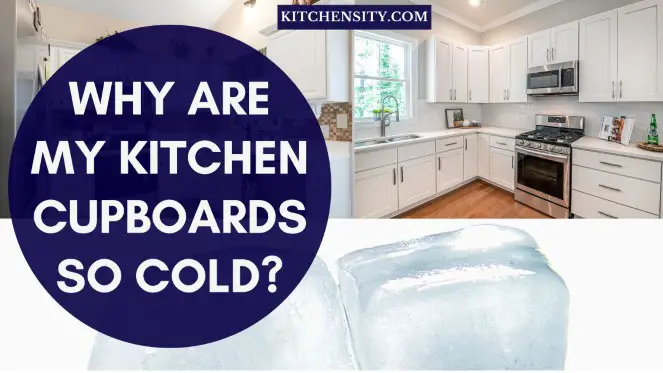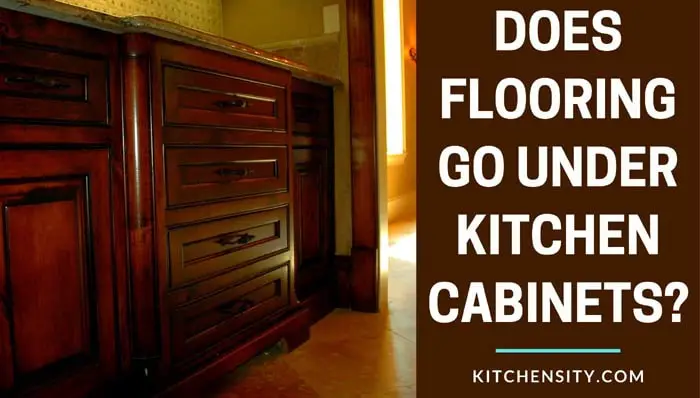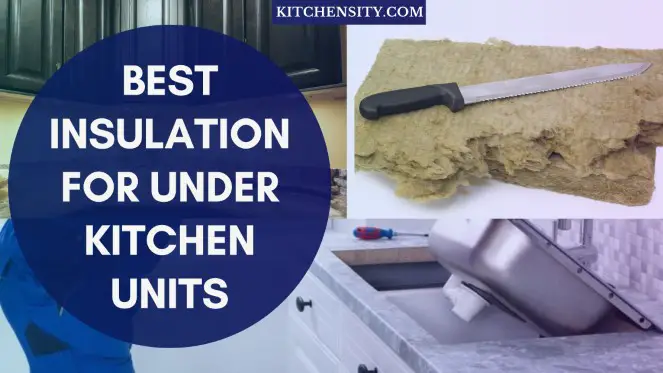Have you ever reached into your kitchen cupboards for a snack, only to find that your fingers feel like they’re touching ice?
It can be quite a shock to discover that your cupboards are unexpectedly cold, especially if you’re used to them being warm and cozy.
But what causes this phenomenon, and is it something you should be worried about?
In this article, we’ll explore the reasons why your kitchen cupboards might be so cold, and what you can do to address the issue.

Table of Contents
Why Are My Kitchen Cupboards So Cold?
There are several reasons why your kitchen cupboards might be cold, including poor insulation, outdoor temperatures, and HVAC system issues.
Additionally, storing cold items in your cupboards or having high levels of humidity can also contribute to the chilliness of the space.
1. The Location Of Your Cupboards
The location of your cupboards can play a big role in how cold they feel. If your cupboards are located on an exterior wall, they may be more susceptible to cold temperatures.
Exterior walls can let in cold air from the outside, which can make your cupboards feel chilly.
2. Poor Insulation
If your cupboards are poorly insulated, they may not be able to retain heat effectively. This can result in a noticeable chill, particularly if your cupboards are located on an exterior wall.
Poor insulation can also increase your energy bills, as you’ll need to use more heat to keep your home warm.
3. Lack Of Heating
If your kitchen is poorly heated, your cupboards may feel cold as a result. If your cupboards are located in a room that is frequently chilly, they may be affected.
Ensure that your home’s heating system is working effectively, and consider adding additional heating sources to your kitchen if necessary.
4. Ventilation
Good ventilation is important in a kitchen, but it can also contribute to cold cupboards.
If your cupboards are located near a ventilation system, they may be exposed to cold air from the outside.
Consider adjusting your ventilation system to reduce the amount of cold air that enters your cupboards.
5. The Effects Of Cold Cupboards On Food
Cold cupboards can affect the quality and safety of the food stored inside them.
If the temperature inside your cupboards is too cold, it can cause certain foods to freeze, which can affect their taste and texture.
Additionally, if the temperature is too cold, it can prevent certain foods from ripening properly. This can result in spoiled or rotten food, which can be dangerous to consume.
6. Tips For Warming Up Your Cupboards
If your kitchen cupboards are too cold, there are several things you can do to warm them up. Some tips include:
- Use a space heater to warm up the area around your cupboards.
- Add insulation to your cupboards to help them retain heat.
- Seal any gaps or cracks around your cupboards to prevent cold air from getting in.
- Move any cold-sensitive foods to a warmer area of your kitchen.
- Consider installing a small heater inside your cupboards to keep them warm.
How Can I Prevent My Kitchen Cupboards From Being Cold?
If you’re tired of reaching into cold kitchen cupboards, there are several steps you can take to prevent this issue from occurring:
- Insulate Your Cupboards: Poor insulation can allow cold air to seep into your cupboards, making them feel chilly. Installing weatherstripping or insulation around the edges of your cupboards can help to seal them and prevent cold air from entering.
- Keep Your Home Warm: If your cupboards are located on an exterior wall, they may be more susceptible to cold air from outside. To combat this, make sure your home is well-insulated and consider using a space heater or other heat source to keep the temperature consistent.
- Avoid Storing Cold Items In Your Cupboards: If you frequently store items like cold drinks or frozen food in your cupboards, this can contribute to the overall chilliness of the space. Try storing these items elsewhere, such as in the refrigerator or freezer, to reduce the amount of cold air that enters your cupboards.
- Improve Ventilation: Good ventilation can help to regulate temperature and humidity levels in your kitchen, which can in turn help to prevent cold cupboards. Open windows or use an exhaust fan to improve airflow and reduce moisture levels.
By taking these steps, you can help to prevent your kitchen cupboards from being cold and uncomfortable.
If you continue to experience issues with cold cupboards, it may be worth consulting a professional to evaluate your home’s insulation and HVAC system.
Some Important Questions
1. How Do I Stop Moisture In My Kitchen Cupboards?
Moisture in kitchen cupboards can be caused by a variety of factors, including poor ventilation, high humidity, and water leaks.
- To prevent moisture from building up in your cupboards, you can take the following steps:
- Use a dehumidifier in your kitchen to remove excess moisture from the air.
- Keep your kitchen well-ventilated by opening windows or using an exhaust fan.
- Fix any leaks or water damage in your kitchen to prevent moisture from entering your cupboards.
- Avoid storing wet items in your cupboards.
- Use moisture-absorbing products, such as silica gel packets or baking soda, in your cupboards to absorb excess moisture.
2. What Should The Temperature Be Inside A Kitchen Cabinet?
The temperature inside a kitchen cabinet should be around room temperature, which is typically between 68 and 72 degrees Fahrenheit (20 to 22 degrees Celsius).
However, this can vary depending on factors such as the location of your cupboards and the climate where you live.
If your cupboards are located on an exterior wall or in a particularly cold or hot part of your home, you may need to take extra steps to maintain a comfortable temperature inside them.
3. Why Is The Inside Of My Cabinets Sweating?
Sweating inside kitchen cabinets can be caused by a variety of factors, including high humidity, poor ventilation, and temperature fluctuations.
When warm, moist air comes into contact with a cold surface (such as the inside of a cupboard), it can cause condensation to form, leading to sweating or dripping.
To prevent this, you can take the following steps:
- Improve ventilation in your kitchen by opening windows or using an exhaust fan.
- Use a dehumidifier in your kitchen to remove excess moisture from the air.
- Install insulation or weatherstripping around your cupboards to prevent cold air from entering.
- Ensure that your cupboards are sealed properly to prevent warm, moist air from entering.
- Avoid storing wet items in your cupboards.
Conclusion
In conclusion, several factors can cause your kitchen cupboards to feel unusually cold, from poor insulation to outdoor temperatures to HVAC system issues.
While it may not be a serious problem, it can be uncomfortable and may lead to increased energy costs.
By taking steps to insulate and seal your cupboards, regulate your home’s temperature and humidity, and avoid storing cold items in your cupboards, you can make your kitchen a more comfortable and efficient space.
So if you’re tired of reaching into a chilly cupboard, take action today and get your cupboards feeling warm and inviting once again!
YOU MAY ALSO LIKE
- How to Insulate Under Kitchen Cabinets?
- Best Insulation for Under Kitchen Units
- How to Insulate Under Kitchen Sink?
- Best Insulation Under The Kitchen Sink
- Can You Use Loft Insulation Under Kitchen Cabinets?
- What Can I Put Under My Kitchen Sink to Protect My Cabinets?
- Can You Put Kitchen Cabinets On Top Of Vinyl Plank Flooring?
- How To Fix Scratched Kitchen Cabinets?
FAQs
-
Is It Normal For Kitchen Cupboards To Be Cold?
It’s not unusual for kitchen cupboards to feel cold, especially if they’re located on an exterior wall. However, if your cupboards feel excessively cold, it could be a sign of poor insulation or inadequate heating.
-
Can Cold Cupboards Affect The Quality Of Food Stored Inside?
Yes, cold cupboards can affect the quality and safety of the food stored inside. If the temperature is too cold, it can cause certain foods to freeze, which can affect their taste and texture.
Additionally, it can prevent certain foods from ripening properly, which can result in spoiled or rotten food. -
Can Adding Insulation To My Cupboards Help Warm Them Up?
Yes, adding insulation to your cupboards can help them retain heat more effectively, which can make them feel warmer. This is particularly effective if your cupboards are located on an exterior wall.
-
Can I Use A Space Heater To Warm Up My Cupboards?
Yes, a space heater can be an effective way to warm up the area around your cupboards.
However, it’s important to ensure that the heater is positioned safely and not too close to any flammable materials. -
Do I Need To Hire A Professional To Warm Up My Cupboards?
In most cases, you should be able to warm up your cupboards yourself using some of the tips outlined in this article.
However, if you’re unsure or have more serious issues with insulation or heating, it may be a good idea to consult a professional.
Katrina Smith is a seasoned expert with over 25 years of experience in all things related to cooking and the kitchen. As an avid cook and kitchen enthusiast, she is passionate about sharing her knowledge and expertise on cookware, kitchen appliances, kitchen tips, and kitchen staples.
Through her articles and reviews, Katrina aims to inspire and help others improve their cooking skills, experiment with different ingredients, and invest in quality cookware and appliances.

![3 Effective Ways To Update Old Kitchen Cabinets [Under $100] 3 How To Update Old Kitche Cabinets](https://www.kitchensity.com/wp-content/uploads/2021/05/How-To-Update-Old-Kitche-Cabinets.jpg)
![Refacing Kitchen Cabinets: An Ultimate DIY Guide [2023] 4 Refacing Kitchen Cabinets](https://www.kitchensity.com/wp-content/uploads/2021/05/Refacing-Kitchen-Cabinets.jpg)



